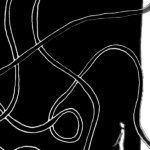There’s no way you’ll ever be able to get this right.
by Keetje Kuipers
Sometimes the universe gets it right and delivers some important advice to us at just the moment when we need it most. This was true for me a couple of years ago at Bread Loaf when I heard Terrance Hayes give a talk about practicing failure.
At the time, I was in the midst of writing and rewriting a poem about my daughter’s black baby doll. However, I had been too much of a coward to share drafts with my POC poet friends, and every white poet who read it had told me that I shouldn’t try to publish it. Their list of reasons was long, but all boiled down to the same thing: the combined elements of race, ownership, and the body created a series of subjects too sensitive for me, a white poet, to touch. Their message was clear: there’s no way you’ll ever be able to get this right.
And yet, they gave me edits on the poem and I took them—because there was something there on the page that I was still interested in doing, though I wasn’t yet sure what it was. I dutifully drafted and redrafted the sonnet until it had become neutered of all emotion and, more importantly, all risk, until it was a dead, meaningless thing on the page, soppy and heartsick and cowering. This is where I was at that particular summer evening when Terrance stepped up to the podium in the Little Theater.

As he spoke, a feeling I had been carrying around inside of me began to become a thought. My poem’s meaning—its very reason for existing—was intricately bound up in its inevitable failure. The purpose of writing it wasn’t to “get it right”—to demonstrate myself as an ally or to attempt to absolve my own complicity in the mortally racist culture we all make our lives in. I hadn’t started writing the poem because I wanted to look good; I’d started writing it because it scared the hell out of me, and that still felt like an act of social engagement that might have some value.
Deciding to seek publication for an unfinished poem wasn’t a new idea for me. I’ve always believed that sharing with readers works that are still in draft can be a way of pulling back the curtain on a process that is really a lot less mystical than we writers sometimes make it seem. But I had never considered sending out for publication a poem that would never be finished, one that honestly couldn’t be finished (at least not by me). Like many of us, I wish to commit no harm through my work. However, at the same time, I feel deeply that we can do no good without risking harm. Mostly, though, I think we risk embarrassing ourselves. And we should.
My notes from Terrance’s talk that night have long been lost, but I remember that at one point he spoke to the Hoagland debacle. My take away from that episode is probably different from Terrance’s, but I reached it after listening to what he had to say about failure. For me, Hoagland’s mistake wasn’t writing or even publishing “The Change” (which Daisy Fried does an excellent job of breaking down here). No, the mistake was in not fessing up to the obvious fact that the poem was, in many ways, a failure, a belly flop, a full-on mess of an attempt by a white poet to engage with race in America today.
When I considered Hoagland’s poem from that perspective, all the feedback I’d been getting about my unpublishable poem became the thing that made me want to publish it. “I Buy My White Daughter a Black Doll” (published in this magazine’s pages before I joined the editorial staff) was and remains a most definite failure in many ways, particularly in terms of my being able to bring sufficient complication to the themes and figures of the poem. However, I sought a home for it because I found the idea of sharing my failure (and, more importantly, my attempt) to be an important part of being a citizen poet. How can we ever hope to get it right if we never risk getting it all wrong?
When Dana Schutz’s painting of Emmett Till, entitled Open Casket, was unveiled to fervent protest last year at the Whitney Biennial, I had a chance to consider this moral dilemma again, and I followed Schutz’s public responses to the protests with interest. While she admitted knowing that the painting is “problematic,” the words I was listening for were ones she never said: the painting is a failure, and could never be anything but a failure. As explanation, Schutz stated that “art can be a space for empathy, a vehicle for connection.” While this is certainly true in theory, it doesn’t always play out in practice. Open Casket, like “The Change,” would be a much more interesting work of art if Schutz understood its deeply elemental failure—her failure—and could talk about it openly.
The ideas that Terrance introduced me to that night—practicing failure publicly, as both a writer and a citizen—are vitally important poetic precepts. Each featured writer in “On Failure” will present a work of their own that they see as a failure, and we’ll have a chance to peek behind the curtain with them and gaze at the necessary mess they’ve made.
Keetje Kuipers is an Associate Editor at Poetry Northwest.
About the Series
“On Failure” is a series conceived by Keetje Kuipers and the editors of Poetry Northwest, featuring essays from a range of writers that investigate the practice of failure, both as poet and citizen. Each featured writer will present a work of their own that they see as a failure, and offer a chance to peek behind the curtain at their creative process. Other entries in the series can be found here.
